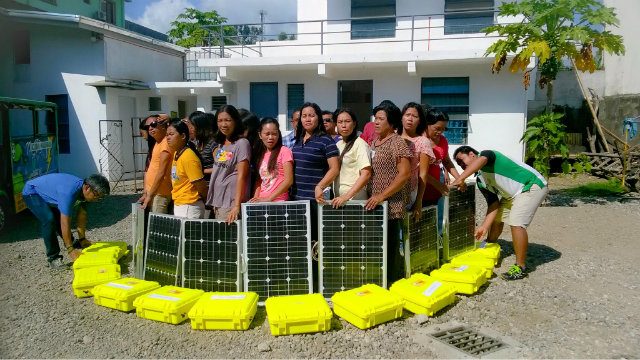SUMMARY
This is AI generated summarization, which may have errors. For context, always refer to the full article.

TACLOBAN CITY, Philippines — Yes, there are “solar scholars.”
RE-Charge, an initiative that brought a fleet of electric jeepneys to Tacloban, held the first Solar Scholars Workshop in Tacloban City on May 26 to 28. The workshop aimed to equip the participants with knowledge on how to use “Tekpak” during disaster response and medical emergencies, especially in the geographically isolated and disadvantaged areas where there is no electricity.
The RE-Charge Tekpak is a portable community solar system capable of powering laptops and lights, charging cell phones, and radios, and powering medical services and other community needs. It is composed of 100-watt solar panels, 3 LED light bulbs, inverter, and batteries. It is placed in a water-tight suitcase.
The initiative also generates green jobs and draws more investments towards local sustainable enterprise.
The workshop had 31 participants coming from Concepcion, Panay, San Vicente, Barangay Bulosao, Lawaan, Barangay Jagnaya, Barangay Asgad, Barangay Cagaut Salcedo, San Joaquin Palo, and Barangay Cabalawan. Eleven of the participants were women, and some of them came from the youth sector. Most of them were survivors of Super Typhoon Yolanda (Haiyan) in November 2013.
In the 3-day workshop, the participants learned about the basics of renewable energy, understanding how renewable energy should be integrated into disaster preparedness programs.
They also learned the concept of climate change and its effects, the different sources of renewable energy, the basics on solar energy. Practical exercises on how to operate the RE-Charge TekPak were conducted.
One of the towns invited to join the workshop is from the island communities of San Vicente in Northern Samar. The town is one of the geographically isolated and disadvantaged areas in Region 8. It did not have a 24-hour supply of electricity like the island towns of Capul, San Antonio, and Biri.
Their Municipal Health Office (MHO) was also greatly affected by their disrupted supply of electricity. The schedule for their electricity was from only from 4pm until 11pm. It has been a great challenge for the local government when mothers delivered babies beyond 11pm.
Despite their power situation, the town was able to record zero maternal death since 1976, and this became possible through the efforts of their MHO and medical staff.
Woman solar engineer
Zenaida Benitez, a Yolanda survivor from Hilotongan, Bantayan Island Cebu, flew to Tacloban to join the RE-Charge Solar Scholars Workshop.
Benitez was one of the scholars of Barefoot College who studied in India for 6 months. She was among the first batch of 36 women who joined the program, which was participated by 11 countries worldwide. In the Philippines, there were 7 women who represented the country including the Aeta coming from Luzon.
“Naging excited ako ng maimbitahan ako dito sa Solar Scholar Workshop. Ito ay para na din maibahagi ko ang aking nalalaman sa kapwa ko participants lalo na sa mga kababaihan at madagdagan din yung kaalaman ko,” Benitez said.
(I got excited when I was invited to the Solar Scholar Workshop. This allows me to share with my fellow participants, particularly women, what I’ve learned. This can also enrich my knowledge.). – Rappler.com
To learn more, you may visit the RE-Charge Tacloban’s website here.
Add a comment
How does this make you feel?
There are no comments yet. Add your comment to start the conversation.